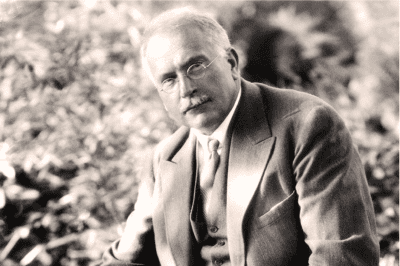
4 Minutes
CONTENTS
CG Jung lived and had a practice in Kusnacht Switzerland
Humans are mortals; their deaths are inevitable. The concept of immortality, however, is not as unreachable as it may seem. Someone’s creations, ideas, and discoveries outlast their physical presence, making their influence immortal.
“The influence of each human being on others in this life is a kind of immortality.” —John Quincy Adams
Carl Gustav Jung, born in Kesswil, Switzerland in 1875 and died in Kusnacht, Zurich, Switzerland in 1961, was a Swiss psychiatrist and one of the pioneers of analytical psychology. His findings and contributions to psychology are immortal; they long surpassed his grave and today numerous private practice and residential rehabilitation centers and clinics use his philosophy not just in Switzerland but worldwide and influence today’s mental health and addiction treatment methods significantly. He first started out as a supporter of Sigmund Freud and the Freudian approach to the psyche. He was also Freud’s collaborator for five years. Soon, differences in viewpoints arose and their collaboration ended. While Freud believes in the conscious as being a storehouse for unacceptable repressed desires, Jung relates it to the repressed memories pertaining to the individuals and to their ancestral past. Another main difference is the cause of the behavior. For the former, the human being’s actions are influenced and caused by past experience, particularly during childhood. As for the latter, the actions are related to past experiences as well as aspirations in the future. Jung also delved into three main concepts while practicing therapy and psychology in his institute that helped and still do in today’s mental health treatment: extroversion and introversion, archetypes, and the collective unconscious.

Extroversion and Introversion
Jung separated people into two categories according to their personalities; introvert and extrovert. He claimed that the introverted person is insightful, calm, and focused on visions and world-reflection. On the contrary, an extrovert is open to the outside world; focused on others, and is always energetic and lively. Where the introverts view the world from a subjective point of view, the extroverts interpret it objectively.
These definitions were a few of the first pillars in order to understand the human psyche. They differ from the modern ideas of introversion and extroversion, but they do share some similarities. Modern theories focus on the behavioral aspects that can classify the personality. The Jungian perspective, however, is all about the person’s interpretation of the world.
This website offers you a free test where you can check if you fall under the introvert or extrovert category.
Archetypes of human behavior
Jung defines archetypes as forms of knowledge that are innate and passed down from one’s ancestors. They play huge parts in influencing human behavior. Jung separated them into four categories: the anima or animus, the shadow, the persona, and the self.
- The anima/animus:
Tendencies that are often classified as “feminine” or the unconscious female component in the male psyche fall under ‘Anima’. Animus is the opposite; it’s the unconscious male component of the female psyche —the tendencies that are “masculine”. - The Shadow:
The shadow is all that is not consciously shown to others or in public. This could have either negative or positive connotations. A shadow could be the hidden but incredible talents and abilities or negative and malicious intents towards others. Whether it be someone good or bad, and because it is consciously hidden and suppressed, it is bound to be projected or reflected in an aspect or another in our lives. - The Persona:
The persona is what is projected to the others. In opposition to the shadow, it is what is consciously displayed to the world. It conceals the shadow and only selects what is impressive or useful to be shown. - The Self:
Lastly, the self is all that encompasses everything. It is the totality of our being, the whole personality. It, of course, is so widely different for each person.
The website 16 personalities presents a thorough test to classify each person into one of the sixteen personalities. The test encompasses questions about behaviors and daily life in order to reach the final conclusion.
The Collective Unconscious
One of Jung’s most unique theories is the collective unconscious. Unlike plenty others, Jung did not believe that we are born as blank canvases. He explained that each individual is born with a certain blueprint already imprinted internally. It is the innate elements of the person’s nature, thus, everything that can determine the course of our lives is already in us. This theory was not majorly supported back then, but nowadays it is even proved, to some extent, by the researches and tests done. Jung also believed that each person’s blueprint is different due to the archetypes aforementioned.
Although Carl Jung’s death happened more than half a decade ago, his influence still lives on to this day. He became immortal through his findings and focus on the human psyche. This all helped even more in the treatment of mental health. Instead of the false disregard of dreams and future aspirations, Jung started taking into consideration both the past and what the person hoped to achieve. Likewise, modern treatments include this look towards what is coming instead of only the past, to help patients. It is this immortality of the idea that transcends into better solutions and a progressive look.
A UNIQUE METHOD TREATING Mental Health
a successful and proven concept focusing on underlying causesMental Health TREATMENT LASTING APPROACH
0 Before
Send Admission Request
0 Before
Define Treatment Goals
1 week
Assessments & Detox
1-4 week
Psychological & Holistic Therapy
4 week
Family Therapy
5-8 week
Aftercare
12+ week
Refresher Visit
Mental Health Insights
latest news & research on Mental Health
Mental Anguish
Mental anguish, a severe and extreme type of emotional pain, can cause profound and extensive effects on the life of a person
read more


































































